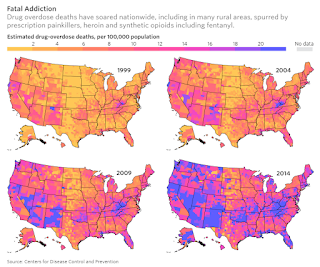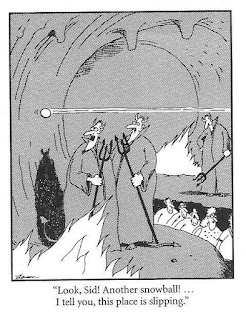Fentanyl: From China to the Heartland
For Small-Town Cops, Opioid Scourge Hits Close to Home
Excerpt:
Fentanyl is supercharging the longstanding problem of drugs in small towns. Police, forensic labs and prosecutors are struggling to identify and safely intercept new narcotics that can sicken or kill anyone who handles them, and to combat trafficking networks that sometimes extend many hours away. Death rates from overdoses are now higher in rural areas than in big cities, reversing a historic trend.
“It’s hard to imagine how it could have gotten worse than the heroin we were dealing with,” says Brad Schimel, Wisconsin’s Attorney General. But “the fentanyl has taken this to a new level.”
Fentanyl and other synthetic opioids aren’t just more powerful than heroin, they are cheaper and easier to produce, made from chemicals instead of fields of poppies. Nationwide, 13,882 drug seizures tested positive for fentanyl in 2015, more than double the 2014 number, according to the Drug Enforcement Administration....
While Appalachia and the Northeast have been hardest hit by the new opioids, the upper Midwest is also reeling. On the other side of a bridge from Superior, in northern Minnesota, police working for a tri-county task force have intercepted 64.5 grams of fentanyl so far in the third quarter, enough of the deadly narcotic to kill 32,000 people, up from 12 grams in the second quarter. Officials in and around Fargo, N.D., are grappling with a rash of fentanyl-related overdoses this year, including among high-school students who were snorting the drug through nasal-spray bottles.
In some cases U.S. dealers or addicts are ordering fentanyl or chemically similar drugs online, directly from suppliers in China, which the DEA says produces much of the world’s synthetic opioid supply. The agency says a growing number of local dealers have bought pill presses to turn powdered fentanyl into counterfeit painkillers.
Chinese suppliers are also sending large quantities of fentanyl or its chemical ingredients to Mexico, where cartels mix the drug into the heroin supply and smuggle it to U.S. cities, says the DEA.
The big-city dealers who bring fentanyl-laced heroin to the Upper Midwest dip in and out of town, and often recruit local addicts to help them hide or sell drugs, making then tougher to catch, police say.
In the twin towns of Superior, Wis., and Duluth, Minn., separated by a small bay at the end of Lake Superior, the business is seriously taxing local law enforcement. “They’re using more and more middle people to distance themselves from the sale,” says Jeffrey Kazel, commander of the tri-county task force and a lieutenant in the Duluth, Minn., police department.
For the sellers, some with gang ties, targeting smaller towns is a smart marketing move. The customers have the means to pay, and there’s less of the cutthroat rivalry that leads to frequent shootings in many urban centers. The return is also greater. A gram of heroin that sells for $50 to $100 in Chicago fetches up to $200 in Northern Wisconsin or Minnesota, law-enforcement officials say.Comment: Image source top is the WSJ article (image snip). Bottom is image snip from Banyan Treatment Center . Source of image below
"This is a demand-driven plague": Fatal drug overdoses outpace gun deaths in this city https://t.co/clwHoP2RSt pic.twitter.com/HSHh5oZjtb
— NBC News (@NBCNews) June 10, 2017























